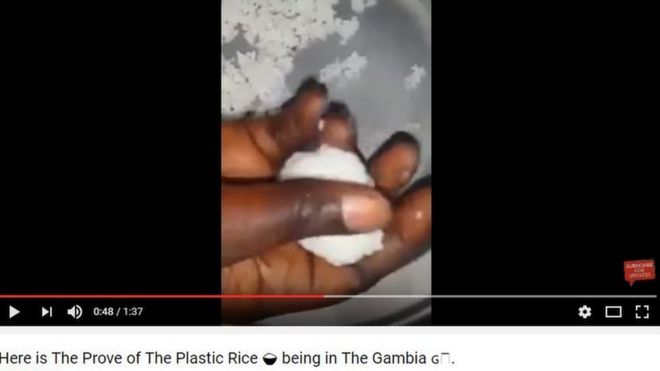
Why people believe the myth of 'plastic rice'
Despite little evidence that it's a widespread problem, rumours of "plastic" rice being sold in Africa and elsewhere persist on social media - driven in particular by viral videos which show bouncing rice balls.
The rumours spread over the last few weeks in Senegal, Gambia and Ghana - and reached such a pitch that the Ghana Food and Drugs Authority decided to carry out an investigation.
Advertisement
They invited consumers and traders to submit samples of any rice brands they suspected of being made of plastic - and eventually concluded that there was no plastic rice being sold on the Ghanaian market.
Originating in China, rumours on social media have circulated since about 2010 of plastic rice being manufactured and mixed in with the real rice supply in order to trick consumers. The rumours were originally prompted by "fake rice" scandals, although they didn't involve food made entirely out of plastic.
In one case, companies were passing off ordinary but edible rice as premium "Wuchang" grains. Then in 2011, reports emerged that rice was being produced with potatoes and an industrial sticky resin. The rumours were further compounded when a Chinese restaurant association official warned that eating three bowls of "plastic rice" was the equivalent of eating one plastic bag.
At no point, however, were there confirmed cases of large amounts of plastic chips being passed off as rice. "Plastic rice" is manufactured for use in shipping boxes, but it's likely that in most cases the cost of the chips would actually be more expensive than real rice.
The story had reached social media in Africa by 2016 when Nigerian customs authorities confiscated 2.5 tonnes of rice. Customs officials initially claimed that the rice was plastic - and were later forced to backtrack when the country's health minister said there was no evidence for the claims. Tests showed that the rice did however contain a high level of bacteria, Nigeria's National Agency For Food and Drugs said.
Bouncy rice
But rumours have persisted that plastic is being sold as rice, fuelled by videos which show people bouncing rice balls. Some also purport to show how the rice is made in factories.
Advertisement
Alexander Waugh, director of the Rice Association, a UK-based industry group, says the videos may be authentic - but not because the grains are plastic. Rice - when prepared in the right way - can actually bounce, Waugh told BBC Trending radio.
"The natural characteristics of rice are carbohydrates and proteins and you can do something like that with rice," Waugh says.
It could be that protectionism and a distrust of foreign imports is behind the persistence of the rumours, according to journalist Alexandre Capron of France 24.
Capron has worked extensively to debunk the myths around plastic rice and says some people are deliberately sharing fake videos to encourage consumers to buy more locally grown rice.
Advertisement
"The rumour is more popular in countries which are dependent on imported rice like Ivory Coast or Senegal," he says. "The rumour is so huge that governments are compelled to make statements... as to why there is no plastic rice."
Hassan Arouni, editor of the BBC's Focus on Africa, has looked into the "fake rice" rumours and says he's not sure whether people in West African countries are deliberately targeting food exporting countries such as China. But he does think food safety authorities in West Africa are doing the right thing by addressing the rumours head-on.
"I think that's the way to go and demonstrate to the public this [rumour] is not true," he says. "I think it will reassure people that this is fake news and probably somebody being naughty on the internet."
Advertisement